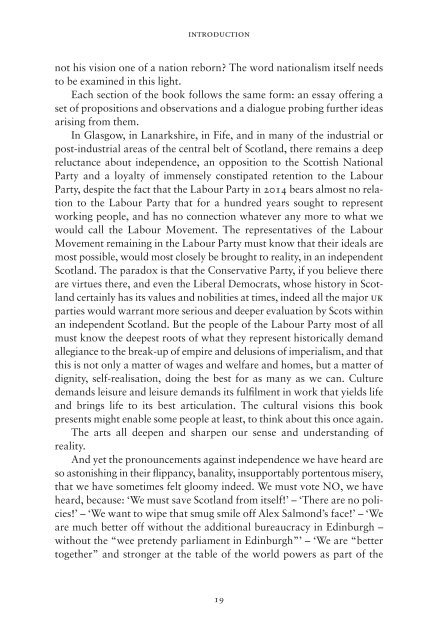Arts of Independence by Alexander Moffat and Alan Riach sampler
ALEXANDER MOFFAT and ALAN RIACH take a hard look at the most neglected aspect of the argument for Scotland’s distinctive national identity: the arts. Their proposition is that music, painting, architecture and, pre-eminently, literature, are the fuel and fire that makes imagination possible. Neglect them at your peril. For Moffat and Riach, jobs, health and trade are matters of material fact that need to be enlivened by imagination. How can we organise society to help us approach what the arts have to give. Why have we been so poor at representing our arts comprehensively, both within Scotland and internationally? What can be done? How might things be different? The arts are of paramount importance in the modern world. Moffat and Riach take the argument out of the hands of politicians and economists and beyond the petty squabbles of party politics.
ALEXANDER MOFFAT and ALAN RIACH take a hard look at the most neglected aspect of the argument for Scotland’s distinctive national identity: the arts. Their proposition is that music, painting, architecture and, pre-eminently, literature, are the fuel and fire that makes imagination possible. Neglect them at your peril. For Moffat and Riach, jobs, health and trade are matters of material fact that need to be enlivened by imagination. How can we organise society to help us approach what the arts have to give. Why have we been so poor at representing our arts comprehensively, both within Scotland and internationally? What can be done? How might things be different? The arts are of paramount importance in the modern world. Moffat and Riach take the argument out of the hands of politicians and economists and beyond the petty squabbles of party politics.
- No tags were found...
Create successful ePaper yourself
Turn your PDF publications into a flip-book with our unique Google optimized e-Paper software.
introduction<br />
not his vision one <strong>of</strong> a nation reborn? The word nationalism itself needs<br />
to be examined in this light.<br />
Each section <strong>of</strong> the book follows the same form: an essay <strong>of</strong>fering a<br />
set <strong>of</strong> propositions <strong>and</strong> observations <strong>and</strong> a dialogue probing further ideas<br />
arising from them.<br />
In Glasgow, in Lanarkshire, in Fife, <strong>and</strong> in many <strong>of</strong> the industrial or<br />
post-industrial areas <strong>of</strong> the central belt <strong>of</strong> Scotl<strong>and</strong>, there remains a deep<br />
reluctance about independence, an opposition to the Scottish National<br />
Party <strong>and</strong> a loyalty <strong>of</strong> immensely constipated retention to the Labour<br />
Party, despite the fact that the Labour Party in 2014 bears almost no relation<br />
to the Labour Party that for a hundred years sought to represent<br />
working people, <strong>and</strong> has no connection whatever any more to what we<br />
would call the Labour Movement. The representatives <strong>of</strong> the Labour<br />
Movement remaining in the Labour Party must know that their ideals are<br />
most possible, would most closely be brought to reality, in an independent<br />
Scotl<strong>and</strong>. The paradox is that the Conservative Party, if you believe there<br />
are virtues there, <strong>and</strong> even the Liberal Democrats, whose history in Scotl<strong>and</strong><br />
certainly has its values <strong>and</strong> nobilities at times, indeed all the major uk<br />
parties would warrant more serious <strong>and</strong> deeper evaluation <strong>by</strong> Scots within<br />
an independent Scotl<strong>and</strong>. But the people <strong>of</strong> the Labour Party most <strong>of</strong> all<br />
must know the deepest roots <strong>of</strong> what they represent historically dem<strong>and</strong><br />
allegiance to the break-up <strong>of</strong> empire <strong>and</strong> delusions <strong>of</strong> imperialism, <strong>and</strong> that<br />
this is not only a matter <strong>of</strong> wages <strong>and</strong> welfare <strong>and</strong> homes, but a matter <strong>of</strong><br />
dignity, self-realisation, doing the best for as many as we can. Culture<br />
dem<strong>and</strong>s leisure <strong>and</strong> leisure dem<strong>and</strong>s its fulfilment in work that yields life<br />
<strong>and</strong> brings life to its best articulation. The cultural visions this book<br />
presents might enable some people at least, to think about this once again.<br />
The arts all deepen <strong>and</strong> sharpen our sense <strong>and</strong> underst<strong>and</strong>ing <strong>of</strong><br />
reality.<br />
And yet the pronouncements against independence we have heard are<br />
so astonishing in their flippancy, banality, insupportably portentous misery,<br />
that we have sometimes felt gloomy indeed. We must vote NO, we have<br />
heard, because: ‘We must save Scotl<strong>and</strong> from itself!’ – ‘There are no policies!’<br />
– ‘We want to wipe that smug smile <strong>of</strong>f Alex Salmond’s face!’ – ‘We<br />
are much better <strong>of</strong>f without the additional bureaucracy in Edinburgh –<br />
without the “wee pretendy parliament in Edinburgh”’ – ‘We are “better<br />
together” <strong>and</strong> stronger at the table <strong>of</strong> the world powers as part <strong>of</strong> the<br />
19


















